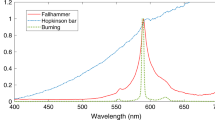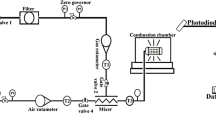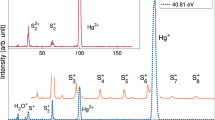Abstract
IN a recent communication1 by one of us, substantial evidence was given of the suppression of the D-line sodium radiation in hydrogen flames by additives—such as carbon dioxide and other polyatomic molecules—which likewise inhibit the chemiluminescence of manganese-promoted calcium oxide in contact with the flames. It was considered that the effect of the additive was greatly to reduce the concentration of hydrogen atoms, the presence of which is necessary for the chemiluminescent effect referred to.
This is a preview of subscription content, access via your institution
Access options
Subscribe to this journal
Receive 51 print issues and online access
$199.00 per year
only $3.90 per issue
Buy this article
- Purchase on Springer Link
- Instant access to full article PDF
Prices may be subject to local taxes which are calculated during checkout
Similar content being viewed by others
References
Arthur, J. R., Nature, 165, 557 (1950).
Kohn, H., Ann. Physik., 44, 749 (1914).
Lewis, B., and Von Elbe, G., “Combustion Flames and Explosions of Gases”, 329 (Cambridge, 1938).
Gaydon, A. G., “Dissociation Energies and Spectra of Diatomic Molecules” (London, 1947).
Author information
Authors and Affiliations
Rights and permissions
About this article
Cite this article
ARTHUR, J., BANGHAM, D., BAULK, R. et al. The Reactions Leading to the Sodium D-Line Radiation in Flames. Nature 166, 358–359 (1950). https://doi.org/10.1038/166358a0
Issue Date:
DOI: https://doi.org/10.1038/166358a0
This article is cited by
Comments
By submitting a comment you agree to abide by our Terms and Community Guidelines. If you find something abusive or that does not comply with our terms or guidelines please flag it as inappropriate.



